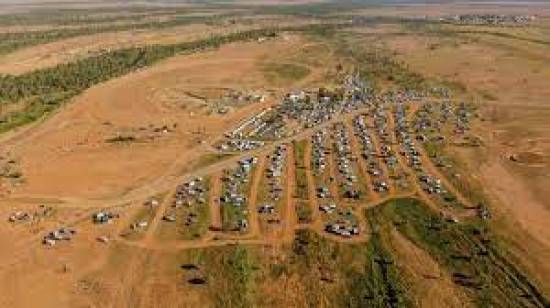Australian town celebrates 25th camel race that had its origins in Abu Dhabi
A remote town in the Australian Outback celebrated on Sunday the 25th anniversary of a camel race with unlikely links to Abu Dhabi’s royal family.
Boulia in Queensland saw its population balloon from 300 to more than 3,000 as visitors came from around the country to attend the Boulia Camel Races.
The race got its start in 1997 after founder Paddy McHugh rounded up 1,000 feral camels, which were considered pests for feeding on grass used for grazing cattle.
McHugh ended up transporting 33 of the camels to Abu Dhabi, where far from being seen as pests, the dromedaries were considered prized race contenders. He then sold the camels to the royal family.
“We spent a bit of time there and saw what a massive industry camel racing was, so we tried to emulate something in Australia that could make our camels worth some money,” he was quoted as saying in a press release.
The Outback event is a family-oriented affair involving live music and novelty competition such as the camel tag and the lawn mower race.
It has evolved from humble beginnings to a “full-blown professional affair,” McHugh said, with drug testing, microchipping, and government-sanctioned gambling.
Gunna, a wild-caught camel belonging to local team Woodhouse Camels, won this year’s 1,500m cup.
“To win this Cup is amazing, every jockey will tell you it’s the main one they want to win,” Jockey Kyrraley Woodhouse said.
“The big 1,500m race is a fully mental race for both the camel and yourself. Some people sing to the jockeys, some people yell a bit, but I stay quiet and then every 50 or 100 meters I give a ‘raaah’ and that does the trick,” she added.
For race organizer Rebecka Britton, the cultural heritage of camels in the outback is an often-overlooked aspect of the annual get-together.
“Camels can be regarded as quite a pest or a feral animal, so I’m not really sure whether or not there’s much significance to the cultural side of things left,” she explained to Al Arabiya English.
“It’s definitely something that we try and market and promote as an organization because of the history and heritage involved in camels essentially settling these western parts of Australia.”
Although worlds apart in many respects, Australia and countries of the Arabian Gulf have a shared heritage of using camels to traverse long distances across barren climes.
First brought to the continent by the British in the 1800s, camels were used to explore the vast wilderness of the Outback.
They were sourced mainly from the Middle East, India, and Afghanistan, and the handlers that came along with them were referred to generically as “Afghans.”
These camel handlers played an essential role in exploring the region and transporting supplies between remote settlements.
A passenger train running through the depths of the Outback was even named ‘The Ghan’ in honor of those early travelers.


